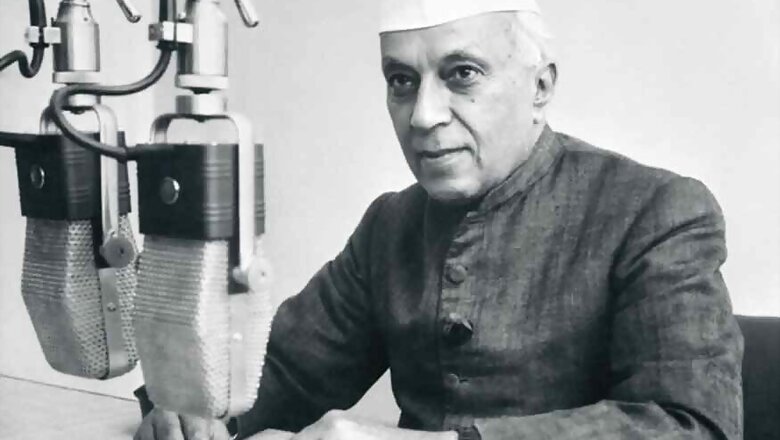
views
A new book names Jawaharlal Nehru as the main “culprit” responsible for creating the Kashmir problem, highlighting how Nehru, moved by idealism, had agreed for a joint communique to reiterate the commitment to plebiscite.
In ‘Kashmir: Land of Regrets’, Moosa Raza — the IAS who served as Chief Secretary of Jammu & Kashmir — offers a succinct summary of Kashmir, making a clear distinction between the ‘Kashmir dispute’ and the ‘Kashmir problem’. According to the author, ‘dispute’ refers to the India-Pakistan contention on the status of J&K since 1948, while the ‘problem’ part deals with issues such as insurgency, uprising, militancy and terrorism that gained currency in the state since 1988, largely as a consequence of the dispute.
Raza’s work makes several startling revelations. As part of Nehru’s numerous follies relating to Kashmir, Raza talks about the joint communique of the prime minister of India and Pakistan in 1953, reiterating the desire of two countries for a plebiscite. This was the time the Nehru government had put Sheikh Mohammad Abdullah behind bars after slogans of ‘Indian army must get out of Kashmir’ were heard in the Valley.
Pakistan prime minister Mohammad Ali Bogra had arrived in New Delhi with his second wife, Aliya, a Lebanese-Canadian who had earlier worked as prime minister’s social secretary. Bogra’s second marriage with a former employee had created a stir in Pakistan, largely led by wives of important politicians and civil servants who were close friends of Bogra's first wife. Indira Gandhi, who would informally act as Nehru’s official hostess, chose to proceed on leave, making it appear as if she was in solidarity with Karachi-based begums.
Nehru agreed for a joint communique, which reaffirmed India and Pakistan’s commitment to a plebiscite. The communique read, “Both the prime ministers were actuated by a firm resolve to settle these problems as early as possible peacefully and cooperatively to the mutual advantage of both countries.”
Raza records that the Kashmir issue was specially discussed and both Nehru and Bogra had a firm view that the dispute should be settled in accordance with the wishes of the people of that state. “The most feasible method of ascertaining the wishes of the people was by a fair and impartial plebiscite.”
Significantly, the two prime ministers had termed the noncompliance of UN resolution of Kashmir due to “lack of agreement in regard to certain preliminary issues” and felt that once these were discussed and out of the way, the next step would be appointment of a Plebiscite Administrator by the end of April 1954.
However, Raza says all this came to a naught because Nehru started having second thoughts over the plebiscite, perhaps on the advice of his ministerial colleagues. Second, India was not happy with the proposal of appointing Admiral W Nimitz, an American, as the Plebiscite Administrator. Around this time, the US was moving closer to Pakistan to counter-balance India’s proclivity towards the USSR and the impartiality of the man who was commander-in-chief of Allied air, land, and sea forces during the Second World War was questionable.
Raza’s work claims that in September 1948, Nehru and Sardar Vallabhbhai Patel had come very close to an idea on how the Kashmir dispute could be resolved. VP Menon, secretary of state, reportedly had many secret conversations with Alexander Symon, deputy high commissioner of UK in India, and Philip Noel-Baker, secretary of state for Commonwealth relations in the UK. Menon brought Nehru and Patel “to the water” (the author quotes Menon).
The sum of the proposed solution was based upon partition of J&K. India was to keep the predominantly Hindu areas without a plebiscite. Two, Pakistan was to keep some of the predominantly western Muslim areas including Gilgit, again without a plebiscite. And last, a decision on the Valley of Kashmir was to be taken by a plebiscite held by the UN.
For Raza, Nehru was among the four main "culprits" responsible for creating the Kashmir problem. The other three "culprits" who find detailed mentions are Lord Louis Mountbatten, Maharaja Hari Singh and Mohammad Ali Jinnah.
Raza’s ‘Kashmir: Land of Regrets’ is an extremely useful introductory book for all those who wish to read credible history of how Afghans, Sikhs and Dogras came to rule Jammu and Kashmir and how the accession took place.
In his foreword, former J&K governor NN Vohra has highlighted the author’s opinion that successive state governments in J&K ruled only at the mercy of the government of India. “Sheikh Abdullah was left with no choice except to compromise with Indira Gandhi and Farooq shook hands with her son Rajiv Gandhi,” Vohra has quoted Raza in his foreword.
As per the high level of discontent of the people of Kashmir against ‘state government in general and the government of India in particular,’ is concerned, Raza has attributed it to maladministration; the high price of mutton; the lack of electricity in winter; the inadequate supply of rations; no governmental presence in the Valley during winter; the congestion and lack of even the basic civil services in Srinagar.
(The author is a senior journalist. Views expressed are personal.)




















Comments
0 comment